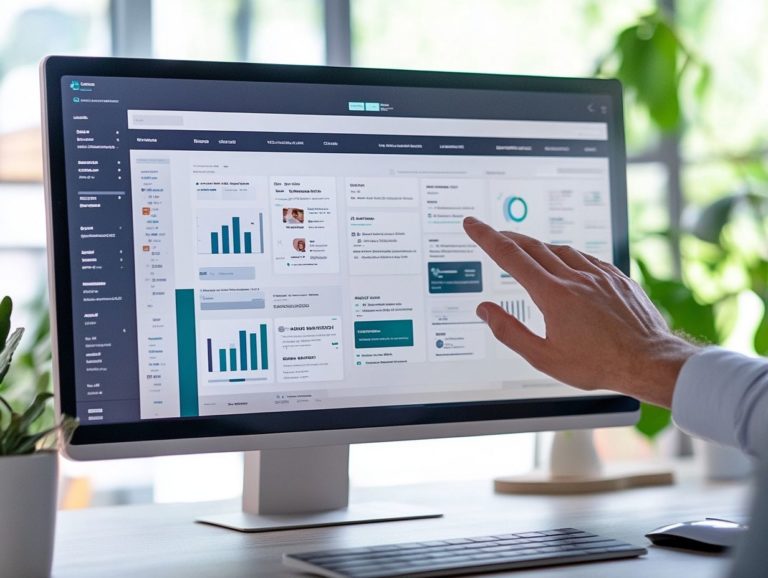How to Leverage CRM for Data Analytics Integrations
In today’s data-driven world, understanding how Customer Relationship Management (CRM) works with data analytics is vital for improving customer experiences.
This article explores CRM and data analytics, highlighting how their integration can lead to better customer insights and smarter decision-making.
We will discuss common integration challenges and effective strategies to overcome them. You will also learn about popular tools and see real-world examples of successful integrations.
Discover how to harness CRM for data analytics and elevate your business today!
Contents
- Key Takeaways:
- Understanding CRM and Data Analytics Integrations
- Benefits of Integrating CRM and Data Analytics
- Challenges and Considerations
- Steps to Successfully Integrate CRM and Data Analytics
- Tools and Platforms for Integration
- Discover Real-World Success Stories of Integrating CRM and Data Analytics!
- Frequently Asked Questions
- What is the purpose of leveraging CRM for data analytics integrations?
- How does CRM help with data analytics integration?
- What are some examples of data analytics integrations that can be leveraged with CRM?
- How can leveraging CRM for data analytics integrations improve marketing efforts?
- What steps should be taken to successfully leverage CRM for data analytics integrations?
- Are there any potential challenges when leveraging CRM for data analytics integrations?
Key Takeaways:

Integrating CRM and data analytics leads to better customer insights and informed decisions. To navigate challenges like data silos, consider how to utilize CRM analytics for better insights with effective strategies and best practices.
Utilize popular tools and learn from successful case studies to achieve effective integration.
Understanding CRM and Data Analytics Integrations
Integrating CRM systems with data analytics is crucial for medium-sized businesses looking to improve customer relationships and leverage CRM integrations to drive sales growth.
This integration not only optimizes customer information and purchase history but also helps you understand your clients better.
As you navigate the complexities of today s digital landscape, the importance of data analytics becomes paramount, giving you the power to enhance operational efficiency and make informed decisions.
Defining CRM and Data Analytics
Customer Relationship Management (CRM) systems are vital to your business strategy. They encompass the technologies you use to manage interactions with potential and existing customers.
Data analytics means looking at data to find useful insights.
Together, CRM and data analytics form a powerful synergy that enhances your understanding of customer preferences and behaviors.
CRM systems streamline communication and meticulously track customer interactions, offering you a comprehensive view of client relationships.
Meanwhile, data analytics allows you to sift through vast amounts of customer data, revealing invaluable patterns and insights. Business intelligence tools, such as Salesforce and Tableau, assist you in visualizing data effectively and making informed decisions.
In addition, predictive analytics is the practice of using historical data to predict future customer behavior. This foresight enables you to tailor your strategies for maximum effectiveness, ensuring you meet your customers’ needs.
Benefits of Integrating CRM and Data Analytics
The integration of CRM systems with data analytics offers numerous benefits, including insights on how to leverage CRM for sales optimization, that can significantly enhance customer satisfaction and streamline business efficiency.
By leveraging data-driven insights, you can refine your marketing strategies, deepen your understanding of clients, and create more personalized customer journeys.
This strategic approach gives you the power to connect with your audience in meaningful ways, driving both engagement and loyalty.
Improving Customer Insights and Decision Making
Utilizing data analytics elevates your understanding of customer insights, giving you the power to make informed decisions that shape your marketing strategies.
These tools explore various facets of customer interactions, revealing not just what customers are purchasing but also their evolving preferences and behaviors over time.
By analyzing patterns and trends within this data, you can tailor your approach to meet the unique needs of your target audience.
Predictive analytics enhances this by using historical data to foresee future behavior, enabling you to anticipate customer needs and adjust your strategies accordingly.
This proactive approach not only strengthens customer relationships but also streamlines decision-making processes, resulting in more impactful marketing campaigns.
Challenges and Considerations

Integrating CRM systems with data analytics can offer remarkable benefits. To fully realize these advantages, consider leveraging CRM analytics, as you will encounter common challenges that require your attention for successful implementation.
Managing data that isn’t organized neatly, ensuring compliance with regulations like GDPR, and aligning team objectives are key considerations that impact your operational efficiency.
Addressing these issues proactively sets the stage for smoother integration and a more effective use of your systems.
Common Obstacles and How to Overcome Them
Integrating CRM systems and data analytics presents challenges, especially in managing disorganized data and ensuring seamless communication between teams. These roadblocks can seriously hinder your operational efficiency.
Data silos create serious roadblocks that you need to tackle immediately. This fragmentation stifles collaboration and leads to incomplete analyses, undermining your strategic goals.
To overcome these obstacles, adopt user-friendly interfaces to improve engagement and data accessibility. Implementing API integrations facilitates smoother data exchanges across different platforms.
Working with top tech leaders like Azure Machine Learning simplifies your integration challenges. They provide robust tools and resources to help your teams harmonize their systems, enhancing your decision-making processes.
Steps to Successfully Integrate CRM and Data Analytics
Successfully integrating CRM systems with data analytics demands a strategic approach and a commitment to best practices. For insights on this topic, consider integrating analytics tools to guide you through the intricate landscape of optimization projects, ensuring that your organization navigates complexities with confidence.
Key Strategies and Best Practices
Key strategies for integrating CRM with data analytics include aligning business goals, selecting the right technology partner, and implementing best practices to enhance your marketing strategies, such as understanding how to leverage CRM for upselling strategies.
Data mapping allows you to visualize customer interactions and touchpoints across various channels. This helps achieve your objectives more effectively.
Prioritizing user-friendly interfaces ensures your CRM is easily navigable, enabling your team to harness its full potential without extensive training.
Encouraging collaboration between departments yields significant benefits. When marketing, sales, and customer support teams work together, they share invaluable insights that deepen client understanding.
By adopting these strategies, you elevate customer satisfaction and cultivate long-lasting relationships essential in today s competitive landscape.
Tools and Platforms for Integration
A variety of sophisticated tools and platforms are crafted to seamlessly integrate CRM systems with data analytics, highlighting the evolution of CRM and its integrations:
- Salesforce: A powerful CRM solution that integrates seamlessly with data analytics.
- Tableau: A robust data visualization tool that helps in analyzing CRM data.
- Power BI: A business analytics tool that provides insights through interactive visualizations.
- Mailchimp: An email marketing platform that integrates effectively with CRM systems.
These tools are tailored to meet the unique needs of mid-sized companies.
Start your integration journey today and see the difference it can make!
Popular CRM and Data Analytics Tools

Among the most sought-after CRM and data analytics tools are Salesforce, Tableau, Power BI, and Mailchimp. Each boasts unique features designed to elevate your customer relationship management efforts.
Salesforce shines with its robust predictive analytics capabilities. You can forecast trends and gain a deep understanding of customer behavior more effectively than ever.
Tableau distinguishes itself with intuitive data visualization options. It transforms complex datasets into easily digestible visuals essential for mid-sized companies that need to make informed decisions swiftly.
Power BI seamlessly integrates with various data sources, offering in-depth reporting functionalities. This empowers diverse organizations to assess their performance metrics in real-time.
Mailchimp simplifies your email marketing processes while providing insightful campaign analytics. This enables you to refine your outreach strategies with precision.
For example, imagine a mid-sized retail firm that harnessed Power BI to analyze previous sales trends. This savvy approach led to a remarkable 20% increase in revenue within just one quarter, thanks to their implementation of data-driven marketing strategies.
Discover Real-World Success Stories of Integrating CRM and Data Analytics!
Real-world examples of successful integrations between CRM systems and data analytics offer invaluable insights into best practices and outcomes for your organization, especially within digital marketing agencies. To achieve this, understanding how to manage CRM integrations effectively is crucial.
By examining these cases, you ll uncover strategies that enhance effectiveness and drive results.
Case Studies and Success Stories
Case studies from various digital marketing agencies reveal how integrating CRM systems and data analytics can propel operational efficiency and deepen client understanding.
Take, for example, a successful agency that grappled with fragmented customer data scattered across multiple platforms. By adopting a unified CRM solution, they centralized their information, granting teams access to real-time insights about customer interactions.
This streamlined approach not only improved communication across departments. It also led to a 30% increase in customer satisfaction ratings, boosting the agency’s revenue growth.
Mid-sized companies can glean valuable insights from such triumphs, particularly regarding the importance of selecting the right tools and investing in employee training for seamless integration.
Frequently Asked Questions
What is the purpose of leveraging CRM for data analytics integrations?
Leveraging CRM for data analytics integrations allows for a comprehensive understanding of customer data, which can be enhanced by leveraging CRM integrations for better insights, informing business decisions and improving overall performance.
How does CRM help with data analytics integration?

CRM systems collect customer information and store it in a central location, making it easier to integrate with data analytics tools for analysis and reporting.
What are some examples of data analytics integrations that can be leveraged with CRM?
Some examples include integrating CRM with predictive analytics tools (which help predict future customer behaviors), customer segmentation software, and data visualization platforms.
How can leveraging CRM for data analytics integrations improve marketing efforts?
By analyzing customer data from CRM and integrating it with marketing tools, businesses can gain insights into customer behavior, preferences, and needs. This allows for more targeted and effective marketing strategies.
What steps should be taken to successfully leverage CRM for data analytics integrations?
- Identify specific business goals and objectives.
- Select appropriate data analytics tools and CRM integrations.
- Conduct proper data mapping and testing to ensure accurate and effective integration.
Are there any potential challenges when leveraging CRM for data analytics integrations?
Some challenges may include data quality and consistency issues, as well as ensuring proper security measures are in place to protect sensitive customer information.
Ready to elevate your CRM and data analytics game? Start exploring the right tools today!






